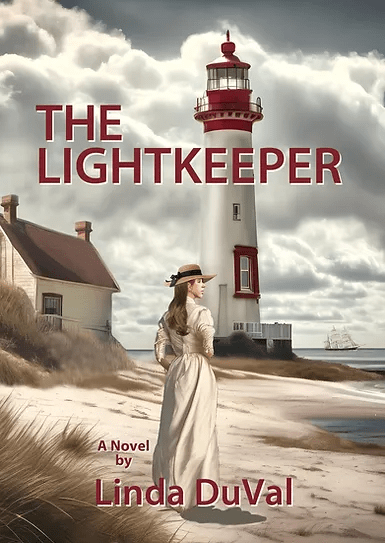Archive for the ‘romance’ Tag
The Lightkeeper by Linda Duval is a tale of a young woman who seeks to be independent and then becomes fiercely so in a time when it is far from the norm.
Because of the Civil War there’s a shortage of men to staff the lighthouses on the Massachusetts coast. Amy Pritchard is mourning the death of her husband when not long afterwards her infant daughter also dies. Seeking refuge and a desire to prove herself as a capable person, she is hired to care for the Point Peril lighthouse.
Amy becomes adept in her role caring for the lighthouse and its grounds, teaches herself to swim, garden and manages life, mostly, on her own. A ferocious storm changes things when she saves a shipwrecked sailor. Amy and the man, who she later learns was the ship’s captain, are destined to meet again months later. From this point the plot becomes predictable, but no less engaging.
Later, a young man is available to take over the lighthouse and Amy must give up her job. The captain offers her a position at his family’s shipbuilding company and housing in Boston, which she reluctantly accepts. This further tests her resolve to maintain her independence.
DuVal has crafted a richly descriptive narrative with interesting characters, although she resorts to caricature in her portrayal of the rural pastor. Still, the story flows well and Amy’s insistence of staying true to herself despite the limitations imposed on women of that era is impressive.
The Lightkeeper
Three-and-three-quarters bookmarks
Ryolite Press, 2024
178 pages

Late last year, a friend and I decided to reread Emma before seeing the most recent film version. We met twice to talk about it shortly after the movie was released, but hadn’t had a chance to see it once theatres closed in March. We’re optimistic about seeing it together – perhaps along with one of my daughters-in-law.
Among the beauties of a Jane Austen novel is the ease and comfort that accompanies revisiting it. It had been years since I’d last read Emma. The depth of the characters – or in Emma’s case her shallowness – along with the descriptive sense of place — made it fun to revisit.
Yes, Emma is intelligent, wealthy and beautiful. She’s also selfish, but has a kind heart. Thankfully, she has Mr. Knightly to try to open her eyes beyond the estate where she lives with her father. Mr. Woodhouse is a distressed man worrying about his health and attempting to project his mindset on others. Emma patiently caters to him.
Although the plot involving a free-thinking, independent young woman with friends representing different social stations and various degrees of romance/matchmaking/unrequited love is familiar to Austen fans, Emma is simply an enjoyable read. The 1995 film entitled Clueless is the perfect description of Emma. She is unable to correctly assess situations when it comes to relationships, whether for others or herself.
Yet, Austen ensures that Emma is an endearing character because her efforts to play a role in the happiness of others are sincere, even if misguided.
Emma
Five Bookmarks
Penguin Classics, 1996 (first published in 1815)
476 pages (includes Introduction, Chronology, Further Reading)

Next Year in Havana by Chanel Cleeton offers an insightful look into Cuba’s history. The trouble is having to wade through the predictable romance stories it’s centered around. Yes, the plural form of story is intentional.
The first begins in 1959 with the Perez family, whose fortunes were built through several generations on sugar production. Nineteen-year-old Elisa has two older sisters, a much younger sister and a brother who’s been banished from the family for his politics. Elisa is first introduced as the family does its best to leave Cuba. Fidel Castro has just taken over the country and the wealthy are being stripped of their status and riches.
The alternating story, set in 2017, revolves around Marisol, Elisa’s granddaughter, who has been tasked with taking her grandmother’s ashes to be scattered in Cuba. There she discovers there was much about Elisa she didn’t know, including a past love, while also embarking on a romantic relationship of her own.
Elisa’s story recounts her affair with a revolutionary, while Marisol strives to learn more about this part of her grandmother’s life. In the process she is attracted to Luis, the grandson of Elisa’s best childhood friend.
Luis is a history teacher at the university in Havana. He serves not just as a tour guide of Cuba’s, but also its political history. As Luis notes, a lot has changed but not much is different in the island nation.
Cleeton manages a few surprises; otherwise the novel’s strengths lie in the historical references.
Next Year in Havana
Three bookmarks
Berkley. 2018
356 pages, plus Reader’s Guide and an excerpt from Cleeton’s next novel

Active imaginations, fear of the unknown, religion, science and a bit of romance are among the themes in Sarah Perry’s epic novel, The Essex Serpent.
The setting is 1893 England. Cora Seaborne is introduced as a soon-to-be well-off widow. Her marriage is an unhappy one, so her husband’s death, which occurs within the first chapter, is not unwelcome. Her husband’s physician is enchanted with Cora, so is her friend/companion, Martha. Her son Francis is less enamored. These characters, and several others integral to the narrative, are well-developed as passionate, intelligent and flawed.
Cora, Martha and Francis travel to Essex where there are long-standing rumors of an unseen, but terrifying creature lurking near a small coastal town. The idea of documenting its presence appeals to Cora. Her friendship with Will, the local pastor, and his wife provide friendship.it’s clear there is the potential for something more than platonic between Cora and Will, this is an attraction of minds. He is certain the panic stirred by the unseen, unnamed creature reflects a lack of faith among his parishioners. She, on the other hand, is intrigued by the idea of discovering, perhaps, a new species.
Cora is aware of the feelings held by her late husband’s doctor, yet she does little to discourage his interest. When she beckons, he appears. Generally, the women are portrayed as strong-minded and intelligent, while several of the men are satisfied simply being in their presence.
Despite the dark setting, Perry injects humor and light moments.
The Essex Serpent
Four Bookmarks
Custom House, 2016
418 pages

Years ago I gave myself permission to stop reading books that couldn’t hold my interest. Nonetheless, I still struggle with the idea that once I start something I should finish it. As I slogged my way through Amy Bloom’s Away, I wondered when I’d set it down for good. I never did.
Bloom’s slow-paced story is about the determination of a mother’s love and the sacrifices she endures. It’s also a narrative about immigrants and fitting into not just new environments but adjusting to different customs and expectations.
Lillian Leyb is a seamstress living in New York City’s lower east end in 1924. As she becomes romantically entangled with her employer and his son, her past is slowly revealed. She left Russia where her husband and, presumably, her child were killed. Lillian becomes a kept woman until she learns from her cousin, a recent arrival from the homeland, that her daughter is still alive. Thus begins Lillian’s journey across the United States including the expansive Alaskan frontier en route to Siberia to find her daughter.
Lillian experiences both the kindness and cruelty of strangers; she’s befriended and betrayed. Bloom incorporates humor and pathos in Lillian’s trek by explaining what’s in store for those Lillian encounters – from her east end companions to those in a Seattle brothel and later a women’s prison in Alaska. Through it all, Lillian remains determined to find her daughter.
Although Away was no page-turner for me, I’m glad I stuck with it. It just took time.
Away
Three Bookmarks
Random House, 2008
240 pages

I am humbled and surprised when I run into someone who tells me my blog is enjoyable and a good place to learn about books (and restaurants when I write about them). When I started The Blue Page Special nearly three years ago, that’s what I hoped for. What’s even better is when one of my readers shares a book title with me, introducing me to a new author or genre. Such is the case with The Rosie Project by Graeme Simsion.
Simsion presents Don Tillman: a nerd. This renowned genetics professor at a Melbourne, Australia, university has created a life so structured that all of his activities are scheduled to the minute. He finds the slightest deviation unnerving. This, along with his intelligence and inclination to view the world through literal eyes, makes him socially inept.
Nonetheless, he decides it’s time to find a life partner and creates the Wife Project, complete with a multi-point questionnaire which has no place for romance. That is until Rosie Jarman, a graduate student in psychology, unwittingly becomes a candidate in the project. Don quickly dismisses her as a viable contender because of what he perceives as her many (human) faults.
The novel is predictable which might warrant a spoiler alert, but I encourage reading it anyway. Don’s voice and personality quirks are well-developed — complete with a few laugh-out-loud moments. Also, Rosie’s criticism that the Wife Project objectifies women is unarguable. Yet, the premise results in a fun read where transformations occur on several, some even surprising, levels.
The Rosie Project
Four Bookmarks
Simon & Schuster, 2013
292 pages

Easy to visualize characters, plots driven by class conflict, issues of the heart (or both) and a very proper sense of, well, what’s proper are what make English Lit so appealing to me. Yes, the above could easily refer to classic British literature, but it also applies to Helen Simonson’s Major Pettigrew’s Last Stand – a very contemporary work.
Simonson’s novel begins with a chance meeting between the Major (his first name is Ernest, while apt doesn’t fit him as snugly as his military title) and Mrs. Jasmina Ali, a Pakistani shopkeeper. Although their paths have crossed in the past, this encounter comes at a vulnerable point in the Major’s life: he’s just learned of his brother’s death. What follows is the evolution of a friendship based on a passion for books and widowhood.
Both characters are thoroughly engaging. The Major in his stilted, decorous yet sensitive manner has appeal, and Mrs. Ali is an exceptionally intelligent woman burdened by a certain sadness associated with being considered an outsider in her home country. Simonson portrays people we know or would like to; they’re well-defined individuals with foibles, principles and dreams. The cast of lesser characters, including Roger, the Major’s obnoxious status-seeking son, enhance the story.
The novel moves at a leisurely pace as the Major and Mrs. Ali embark on a relationship that puts a spark in their step and ultimately has tongues wagging throughout the village. Simonson clearly enjoys thumbing her nose at what’s considered suitable or not.
Major Pettigrew’s Last Stand
Four Bookmarks
Random House Trade Paperbacks, 2011
358 pages (not including the Reader’s Guide)







